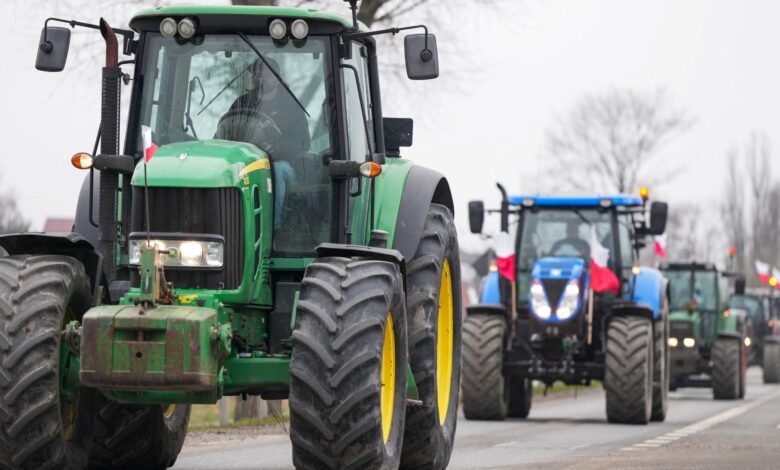EU agrees to cap tariff-free Ukraine farm imports

Beset by angry farmer protests, EU to implement ‘safeguards’ to prevent cheap imports flooding market.
The European Union has agreed a provisional deal to cap duty-free agricultural imports from Ukraine.
The agreement was reached on Wednesday as member states and lawmakers extended a policy of tariff exemptions on many Ukrainian farm products. However, after farmers engaged in protests across the bloc against the cheap imports that were hurting their own sales, limits were placed on the duty-free import of some items.
The tariff exemptions, first granted in 2022, will be extended for a further year to June 2025. But several grains as well as eggs, poultry, honey and sugar were added to a list of products with import “safeguards” intended to prevent cheap imports from flooding the EU market.
Tariffs will be applied on these products if imports exceed the average levels of 2022 and 2023. The European Commission had suggested using 2021 – when Ukrainian exports were not limited by war – as the benchmark.
The regulation “provides for an emergency brake”, the European Parliament said in a press release.
A commitment has also been secured for monitoring by the European Commission of imports of Ukrainian wheat and other cereals and for action to be taken if EU markets are disrupted.
Farmers’ grievances
The 27-nation bloc dropped tariffs on Ukrainian imports in 2022 in a bid to help keep the Ukrainian economy afloat after Russia’s invasion crippled its farm sector.
Many of Ukraine’s previous export routes, including through the Black Sea, have been blocked by warfare.
However, the policy has become a focus of huge protests staged by furious farmers across the bloc.
Ukraine’s EU neighbours – Bulgaria, Hungary, Poland, Romania and Slovakia – have said the imports have upset their markets, leading to protests by farmers and truckers.
The protesters said they face unfair competition because the imports are sold at lower prices and Ukrainian producers are not bound by the EU’s strict rules on environmental standards and animal welfare.
Poland has been a centre of particular anger with farmers blocking borders for months and dumping trainloads of Ukrainian grain.
On Wednesday, Polish farmers said they planned more than 500 road blockades to continue their protest against cheap imports from Ukraine and the European Union’s climate policy.
Due to logistical problems, many Ukrainian cereal exports originally destined for non-EU countries have accumulated in Poland, raising the pressure on local producers.
This week, Polish farmers expanded their protests to shutter the border with Germany.
Ukraine insists that its agricultural exports being routed through Eastern Europe have not damaged EU markets. It notes that a campaign to free up routes now sees about 95 percent of the country’s farm exports once more exiting over the Black Sea.
Kyiv has said it can accept an emergency brake based on 2022-2023 averages. It had insisted that a 2021 benchmark would have been unworkable.
The concessions were agreed three months before European Parliament elections, in which a surge of support is expected for far-right parties that have seized upon the farmers’ discontent.



